Home | Front Page | Blog | Index | New | Contact | Site Map
2002
Fiction
History
Guides - Med
Guides- Euro
|
Biography,
History, and Politics
Angela's
Ashes
Gesher
Vakesher (Bridges and Bonds,
|
Fiction
Don Quixote The Four-Gated City |
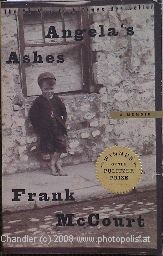 |
Angelaís
Ashes by
Frank McCourt
I should begin by acknowledging that I read this book thanks to Cristhiane, newly married to our old friend Moshe, who had it unread on her shelf. I remember reading the reviews when it came out before we left the States in 1999 and thinking that I would like to read it. I believe it was also recommended to me by my friend Barbara who is a member of a book club that reads mostly non-fiction books. But even with these encomiums, I was surprised by the amount of pure pleasure I got from reading this book. Iím not sure that a non-native speaker and even a non-British native speaker could really enjoy the language in this book, which is as rich and evocative as the myriad characters that make up this story. Iím also not sure that I should have enjoyed it given that most of the characters spend their time lambasting the English and the 800 years of misery they are supposed to have brought down on the Irish. But enjoy it I did. It made me laugh and it made me feel like crying and like screaming. The misery that the McCourt family undergoes has nothing to do with the English and everything to do with Frankís father Malachyís drinking. What is astonishing is that in spite of that fact, richly illustrated in every page, Frank McCourt exudes a much deeper affection for his wayward father than for his long-suffering mother. Perhaps that is the central mystery. How can this man who is so flawed and causes so much hunger, cold, and pure misery for his wife and children exert such a powerful charm on all around him? Some people are born likable, I guess. And likable is how I would describe Frank McCourt on the basis of this book. He has given us an irreplaceable picture of life in Irish poverty that brings to mind the stories my own mother used to tell of her own upbringing in the 20ís and 30ís in the northeast of England and even in some cases, like sugar and bread, wakens my own memories of childhood. The poverty in our lives was nowhere near as extreme, but poverty it was and it brought out both the best and the worst in people, just like it did in Angelaís Ashes. I have resisted the temptation to share with you my favorite stories from the book so that you can discover them like I did, with wonderment and sorrow.
October 15, 2002.
|
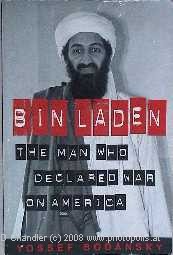 |
Bin Laden
(The Man who declared war on America)
by Yossef Bodansky, 1999, 2001 Jan bought this for Gerry for Christmas. In a book store in NYC he picked it up and at her suggestion didn't by it. She sneaked back and bought it. He started it in NYC and finished it in Israel, both places where the subject of the book really comes to mind. Then Jan got into it. We both found reading it a really hard slog, but intermittently of quite considerable interest. The author worked for US Congressional committees investigating terrorism for many years and wrote it before bin Laden became so infamous. The book seems to be a paste-together of reports that he must have written; as such it is very disorganized. The picture it paints of radical or fundamentalist Islam (called Islamism by the bookís author) is pretty horrific. Fortunately, they are not nearly as efficient and effective as their propaganda would have us believe since many of their operations are foiled before they come to fruition. Does he know his stuff and can he be believed? Reading between the lines it seems likely, but doubts do arise.
March, 2002.
|
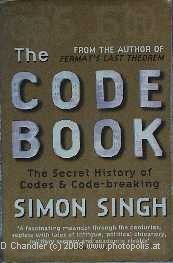 |
The Code Book (The Secret History of Codes & Code-Breaking) by Simon SinghThe book is based on a BBC series of the same name. That should have been a clue that the book would not match its name. It is as much about people and personalities as it is about codes. That is not bad, because the stories are very, very interesting. Would you believe that a man would take two tons of gold from Western USA gold fields in about 1820, bury it in Virginia, and leave a detailed, but coded guide how to find it after his death? Well, believe it or not, the story is told. Much more interesting is the story of the decipherment of Linear B. Is it or isn't it Greek? Until the job - an amazing effort of intuition and perseverance - was done, nobody knew.
Top notch if you like mental sports.
June, 2002.
|
|
|
Doris
Lessing Autobiography (Vol I & II) by Doris Lessing
This was one of Jan's picks based on a memory of having read Lessing's "The Golden Notebook" either in or soon after college. She liked the first volume for its descriptions of pre-war Rhodesia, but she didn't like Lessing's politics or her mealy-mouthed apologies for the Soviet regime.
April, 2002.
|
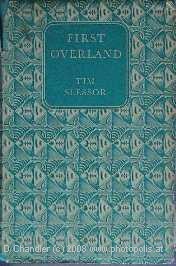 |
First Overland by Tim Slessor, 1956Jan picked up this book for the princely sum of 10p (15 cents) in the lovely abbey of Selby, north Yorkshire. Written in 1957 it tells the story of an expedition carried out by six students or recent graduates of Oxford and Cambridge Universities to be the first to drive all the way from London to Singapore overland, hence the title. The writing was somewhat stilted, but the subject matter was perfect for us as these young men driving two Land Rovers passed through so many places that are familiar to us, in particular: France, Germany, Yugoslavia, Greece, Turkey, Iran, Pakistan, India, Nepal, Burma, Thailand, Malaysia and of course Singapore. As we read the book we relived many of our own travel memories and added Burma and the Stilwell Road to our list of must-see places.Not quite as good as My Life as an Explorer.
Recommended for travel buffs.
June, 2002.
|
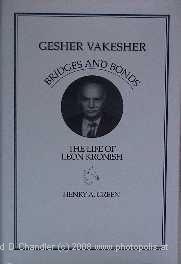 |
Gesher Vakesher (Bridges and Bonds, The Life of Leon Kronish) by Henry A. Green, 1995Leon Kronish was the rabbi for many years of a reform Jewish synagogue in Miami, Florida, from about 1941 to1980. In many ways he was the creator of reform Judiasm in Florida. Gerry got the book by accident. We were at a talk in Jerusalem and his son passed them out for free in association with a talk the son gave. Once started, Gerry found it quite interesting to read about a place to which some of Gerry's relative had retired and the religious issues they faced. Incidentally, in the talk, the son told how he went from "understanding" the Palestinians to finally concluding that they were untrustworthy and that Israel's continued existence depended on continued vigilance.
Recommend only for a very small set of people.
February
,
2002.
|
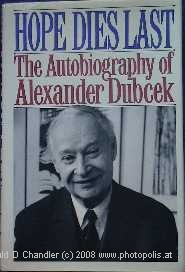 |
Hope Dies Last by Alexander Dubcek, 1993A ghost-written autobiography of the main figure of the Prague Spring liberalization that was crushed by the invasion of the country by Warsaw Pact troops in 1968. A very interesting account of the events leading up to 1968, but a little dissatisfying in that the last chapter of the book, in which one would have expected conclusions to be drawn as to the value and meaning of communism in general and soviet communism in particular, was written without Dubcek's input because he had died in a car accident. The man himself comes across as rather a too-good-to-be-true idealist and public servant. But yet, the impression one is left with is that of a true account.We bought this at a flea market in Lviv, Ukraine. Outside a church there was (is?) a plaza with about 20 "stalls" laid out on the ground. We picked up several books for about $1 each. The cover price was $20. We got a great bargain and, we think, so did the seller. We read it while in Poland, just across the border from his homeland
Recommended for those who remember the Prague Spring.
We are now looking
forward to reading a good biography of Dubcek.
July, 2002.
|
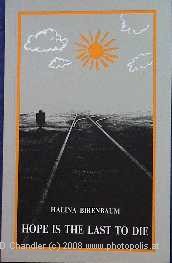 |
Hope Is Last To Die by Halina BirenbaumA first-person account of life in the Nazi death camps of eastern Europe. The writing was not of the best but as we had just visited Auschwitz and Auschwitz-Birkenau, the location of the bulk of the book, we were much better able to understand and visualize the events described. Gerry ended up disbelieving parts of the story. Jan agreed to some extent but on the other hand thought that in order to survive in the camps one had to be very lucky not once but many times, which perhaps makes any of the stories a little hard to believe.
July, 2002. Mixed.
|
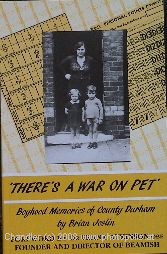 |
There's
A War on Pet by Brian Joslin
A short autobiographical piece about life in Bishop Auckland during the second world war. A very nostalgic read for anyone from the northeast who will relish Joslin's descriptions of small-town life during the war.
Recommended.
|